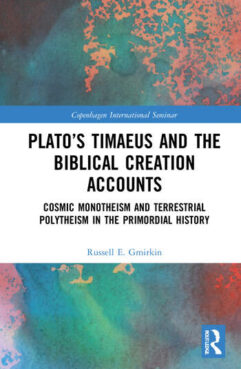And that Yahweh was originally one of many lesser “Sons of God”
 NEW YORK/LONDON — A groundbreaking new book from Routledge by noted biblical scholar Russell Gmirkin proposes that the Jewish notion of a cosmic, eternal God of Creation first appeared in Genesis 1 around 270 BCE, drawing on the account of the creation of the kosmos in Plato’s Timaeus. This new book builds on earlier research by Gmirkin, who has argued that the five books of Moses were written around 270 BCE at Alexandria, Egypt, utilizing various Greek sources found at the Great Library, including the writings of Plato. In Plato’s Timaeus and the Biblical Creation Accounts: Cosmic Monotheism and Terrestrial Polytheism in the Primordial History, Gmirkin argues:
NEW YORK/LONDON — A groundbreaking new book from Routledge by noted biblical scholar Russell Gmirkin proposes that the Jewish notion of a cosmic, eternal God of Creation first appeared in Genesis 1 around 270 BCE, drawing on the account of the creation of the kosmos in Plato’s Timaeus. This new book builds on earlier research by Gmirkin, who has argued that the five books of Moses were written around 270 BCE at Alexandria, Egypt, utilizing various Greek sources found at the Great Library, including the writings of Plato. In Plato’s Timaeus and the Biblical Creation Accounts: Cosmic Monotheism and Terrestrial Polytheism in the Primordial History, Gmirkin argues:
- That the “First Creation Account” in Genesis 1 shows systematic dependence on Plato’s account of the creation of the kosmos by the eternal Demiurge or Craftsman, Plato’s cosmic deity present at the dawn of time.
- That the “Second Creation Account” of Genesis 2-3 shows systematic parallels with Plato’s account of the creation of mortal life by the offspring of the Demiurge, the traditional Greek gods and goddesses living on earth.
- That the figure of Yahweh in Genesis was not the Creator Elohim of Genesis 1 but one of the many “sons of God” who dwelled on earth.
- That the story of the “sons of God” marrying beautiful daughters of men and having heroic gigantic offspring in Genesis 6 drew directly on Plato’s Critias, the sequel to Timaeus.
- That the subsequent corruption of this noble line and their destruction by earthquake and flood in Genesis also drew on Plato’s Critias.
- That Yahweh was only elevated to cosmic status as the sole god worthy of worship in Exodus–Joshua by his later identification with the Creator in the Ten Commandments.
Russell Gmirkin, a biblical scholar and lecturer living in Portland, Oregon, has written extensively on the biblical use of Greek sources from the Great Library of Alexandria. In his 2006 book Berossus and Genesis, Manetho and Exodus, Gmirkin presented evidence that the Books of Moses were written by Jewish scholars around 270 BCE at the Great Library of Alexandria in Egypt, using various Greek historical sources found there. Gmirkin’s 2017 book, Plato and the Creation of the Hebrew Bible, identified Plato’s writings as the most important of these Greek sources and the inspiration for Jewish monotheism, theocracy, and divine laws. This book was the first to systematically compare biblical, Greek and Ancient Near Eastern laws, showing that the Mosaic laws and constitution often most closely resemble those of Athens and that of Plato’s Laws in particular.
###
Additional information about Plato’s Timaeus and the Biblical Creation Accounts is available at RussellGmirkin.com and Routledge.com/Platos-Timaeus-and-the-Biblical-Creation-Accounts-Cosmic-Monotheism. To schedule an interview with author Russell Gmirkin, email at [email protected] (best) or call 503/442-5007.
Disclaimer: The views and opinions expressed in this article are those of the authors and do not necessarily reflect the official policy or position of Religion News Service or Religion News Foundation.




